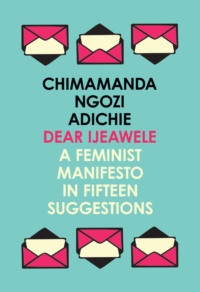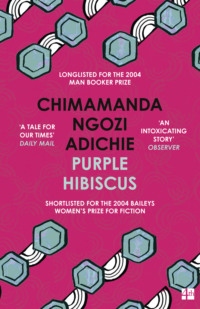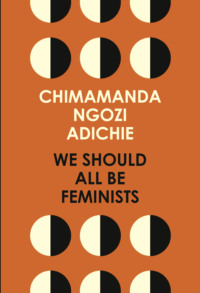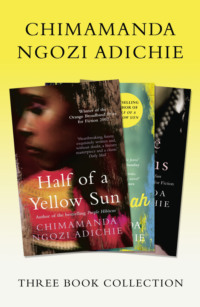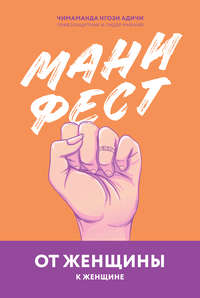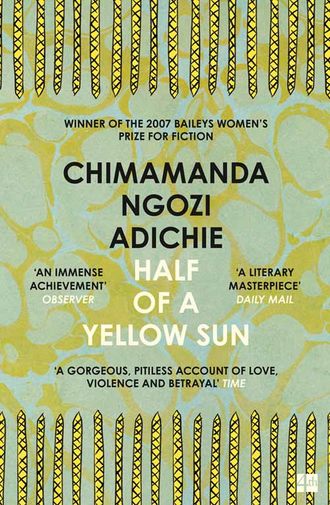
Полная версия
Half of a Yellow Sun
Ugwu examined the scarf tied round his aunty’s head. He could see where it was threadbare, the fabric stretched thin. He remembered that when his cousin’s father died, the family had sent word to her in Lagos, telling her to come home because her father was very sick. If you were far from home, they told you the dead person was very sick.
‘Your mother is sick,’ his aunty repeated. ‘She is asking for you. I will tell Master that you will be back tomorrow, so he will not think we are asking for too much. Many houseboys do not even get to go home in years, you know that.’
Ugwu did not move, rolling the edge of the apron around his finger. He wanted to ask his aunt to tell him the truth, to say so if his mother was dead. But his mouth would not form the words. Remembering his mother’s last illness, when she had coughed and coughed until his father left before dawn to get the dibia while the junior wife, Chioke, rubbed her back, frightened him.
‘Master is not in,’ he said finally. ‘But he will be back soon.’
‘I will wait and plead with him to let you come home.’
He led the way to the kitchen, where his aunty sat down and watched him slice a yam and then cut the slices into cubes. He worked fast, feverishly. The sunlight that came in through the window seemed too bright for late afternoon, too full of an ominous radiance.
‘Is my father well?’ Ugwu asked.
‘He is well.’ His aunty’s face was opaque, her tone flat: the demeanour of a person who carried more bad news than she had delivered. She must be hiding something. Perhaps his mother really was dead; perhaps both his parents had fallen down dead that morning. Ugwu continued to slice, in a turgid silence, until Master came home, tennis whites plastered to his back with sweat. He was alone. Ugwu wished that Olanna had come home as well so that he could look at her face as he spoke.
‘Welcome, sah.’
‘Yes, my good man.’ Master placed his racket down on the kitchen table. ‘Some water, please. I lost all my games today.’
Ugwu had the water ready, ice cold in a glass placed on a saucer.
‘Good evening, sah,’ his aunty greeted.
‘Good evening,’ Master said, looking slightly perplexed, as if he was not certain who she was. ‘Oh, yes. How are you?’
Before she could say more, Ugwu said, ‘My mother is sick, sah. Please, sah, if I go to see her I will return tomorrow.’
‘What?’
Ugwu repeated himself. Master stared at him and then at the pot on the stove. ‘Have you finished cooking?’
‘No, sah. I will finish fast-fast, before I go. I will set the table and arrange everything.’
Master turned to Ugwu’s aunty. ‘Gini me? What is wrong with his mother?’
‘Sah?’
‘Are you deaf?’ Master jabbed at his ear as if Ugwu’s aunty did not know what it meant to be deaf. ‘What is wrong with his mother?’
‘Sah, her chest is on fire.’
‘Chest on fire?’ Master snorted. He drank all his water and then turned to Ugwu and spoke English. ‘Put on a shirt and get in the car. Your village isn’t far away, really. We should be back in good time.’
‘Sah?’
‘Put on a shirt and get in the car!’ Master scribbled a note on the back of a flyer and left it on the table. ‘We’ll bring your mother here and have Patel take a look at her.’
‘Yes, sah.’ Ugwu felt breakable as he walked to the car, beside his aunty and Master. He felt as though his bones were broomsticks, the kind that snapped easily during the harmattan. The ride to his village was mostly silent. As they drove past some farms with rows and rows of corn and cassava like a neatly plaited hairstyle, Master said, ‘See? This is what our government should focus on. If we learn irrigation technology, we can feed this country easily. We can overcome this colonial dependence on imports.’
‘Yes, sah.’
‘But instead, all the ignoramuses in government do is lie and steal. A number of my students joined the group that went to Lagos this morning to demonstrate, you know.’
‘Yes, sah,’ Ugwu said. ‘Why are they demonstrating, sah?’
‘The census,’ Master said. ‘The census was a mess, everybody forged figures. Not that Balewa will do anything about it, because he is as complicit as they all are. But we must speak out!’
‘Yes, sah,’ Ugwu replied, and in the midst of his worry about his mother, he felt a twinge of pride because he knew his aunty would have her eyes wide in wonder at the deep conversations he had with Master. And in English, too. They stopped a little way before the family hut.
‘Get your mother’s things, quickly,’ Master said. ‘I have friends visiting from Ibadan tonight.’
‘Yes, sah!’ Ugwu and his aunty spoke at the same time.
Ugwu climbed out of the car and stood there. His aunty dashed into the hut, and soon his father came out, eyes red-rimmed, looking more stooped than Ugwu remembered. He knelt in the dirt and clutched Master’s legs. ‘Thank, sah. Thank, sah. May another person do for you.’
Master stepped back and Ugwu watched his father sway, almost falling over backwards. ‘Get up, kunie,’ Master said.
Chioke came out of the hut. ‘This is my other wife, sah,’ his father said, standing up.
Chioke shook Master’s hands with both of hers. ‘Thank you, master. Deje!’ She ran back inside and emerged with a small pineapple that she pressed into Master’s hand.
‘No, no,’ Master said, pushing the pineapple back. ‘Local pineapples are too acidic, they burn my mouth.’
The village children were gathering around the car to peer inside and run awed fingers over the blue body. Ugwu shooed them away. He wished Anulika were home, so she would go with him into their mother’s hut. He wished Nnesinachi would drop by now and take his hand in hers and tell him soothingly that his mother’s illness was not serious at all, and then lead him to the grove by the stream and untie her wrapper and offer him her breasts, lifting them up and forward towards him. The children were chattering loudly. Some women stood by and spoke in lower tones, their arms folded. His father kept asking Master to have some kola nut, palm wine, a stool to sit down, some water, and Master kept saying no, no, no. Ugwu wanted his father to shut up. He moved closer to the hut and looked in. His eyes met his mother’s in the dim light. She looked shrivelled.
‘Ugwu,’ she said. ‘Nno, welcome.’
‘Deje,’ he greeted, and then remained silent, watching, while his aunty helped her tie her wrapper around her waist and led her out.
Ugwu was about to help his mother into the car when Master said, ‘Step aside, my good man.’ Master helped her into the car, asked her to lie down on the backseat, to stretch out as much as she could.
Ugwu suddenly wished that Master would not touch his mother because her clothes smelled of age and must, and because Master did not know that her back ached and her cocoyam patch always yielded a poor harvest and her chest was indeed on fire when she coughed. What did Master know about anything anyway, since all he did was shout with his friends and drink brandy at night?
‘Stay well, we will send you word after a doctor has looked at her,’ Master said to Ugwu’s father and aunty before they drove off.
Ugwu kept himself from glancing back at his mother; he rolled his window down so the air would rush loudly past his ears and distract him. When he finally turned to look at her, just before they got to the campus, his heart stopped at the sight of her shut eyes, her lax lips. But her chest was rising and falling. She was breathing. He exhaled slowly and thought about those cold evenings when she would cough and cough, and he would stand pressed to the flinty walls of her hut, listening to his father and Chioke ask her to drink the mixture.
Olanna opened the door, wearing the apron that had an oil stain in front. His apron. She kissed Master. ‘I’ve asked Patel to come,’ she said and then turned to Ugwu’s mother. ‘Mama. Kedu? ’
‘I am well,’ his mother whispered. She glanced around the room and seemed to shrink even more at the sight of the sofas, the radiogram, the curtains.
‘I’ll take her inside,’ Olanna said. ‘Ugwu, please finish in the kitchen and set the table.’
‘Yes, mah.’
In the kitchen, Ugwu stirred the pot of pepper soup. The oily broth swirled, the hot spices wafted up and tickled his nose, and the pieces of meat and tripe floated from side to side. But he did not really notice. He was straining to hear something. It was long, too long, since Olanna had taken his mother in and Dr Patel went in to join them. The peppers made his eyes water. He remembered that last time when she was sick from the coughing, how she cried out that she could no longer feel her legs and the dibia asked her to tell the evil spirits to leave her alone. ‘Tell them it is not yet your time! Gwa ha kita! Tell them now!’ the dibia had urged her.
‘Ugwu!’ Master called. The guests had arrived. Ugwu went into the living room and his hands worked mechanically, serving kola nuts and alligator pepper, uncorking bottles, shovelling ice, laying out steaming bowls of pepper soup. Afterwards, he sat down in the kitchen and pulled at his toenails and imagined what was going on in the bedroom. He could hear Master’s raised voice from the living room. ‘Nobody is saying that burning government property is a good thing, but to send the army in to kill in the name of order? There are Tiv people lying dead for nothing. For nothing! Balewa has lost his mind!’
Ugwu did not know who the Tiv people were, but hearing the word dead made him shiver. ‘It is not yet your time,’ he whispered. ‘Not yet your time.’
‘Ugwu?’ Olanna was at the kitchen door.
He flew off the stool. ‘Mah? Mah?’
‘You mustn’t worry about her. Dr Patel says it’s an infection and she will be fine.’
‘Oh!’ Ugwu was so relieved he feared he would float away if he raised one leg. ‘Thank, mah!’
‘Put the rest of the pottage in the fridge.’
‘Yes, mah.’ Ugwu watched her go back to the living room. The embroidery on her close-fitting dress gleamed and she looked, for a moment, like a shapely spirit who had emerged from the sea.
The guests were laughing now. Ugwu peeked into the living room. Many of them were no longer sitting upright but sloped on their seats, mellowed by alcohol, languorous with ideas. The evening was ending. The conversation would soften into tennis and music; then they would get up and giggle loudly at things that were not funny, such as the front door being difficult to open and the night bats flying too low. He waited for Olanna to go to the bathroom and Master to his study before he went in to see his mother, asleep, curled childlike on the bed.
She was bright-eyed the next morning. ‘I am well,’ she said. ‘The medicine that doctor gave me is very powerful. But what will kill me is that smell.’
‘What smell?’
‘In their mouth. I smelt it when your madam and master came in to see me this morning and also when I went to ease myself.’
‘Oh. That is toothpaste. We use it to clean our teeth.’ Ugwu felt proud saying we, so that his mother would know that he too used it.
But she did not look impressed. She snapped her fingers and picked up her chewing stick. ‘What is wrong with using a good atu? That smell has made me want to vomit. If I stay here much longer I will not be able to keep food in my stomach because of that smell.’
She looked impressed, though, when Ugwu told her that he would be living in the Boys’ Quarters. It was like being given his own house, separate, all to himself. She asked him to show her the Boys’ Quarters, marvelled that it was bigger than her hut, and, later, insisted that she was well enough to help in the kitchen. He watched her, bent over to sweep the floor, and remembered how she used to smack Anulika’s bottom for not bending properly to sweep. ‘Did you eat mushrooms? Sweep like a woman!’ she would say, and Anulika would grumble that the broom was too short and it was not her fault that people were too stingy to buy longer brooms. Ugwu suddenly wished that Anulika were here, as well as the little children and the gossiping wives of his umunna. He wished his whole village were here, so he could join in the moonlight conversations and quarrels and yet live in Master’s house with its running taps and refrigerator and stove.
‘I will go home tomorrow,’ his mother said.
‘You should stay a few more days and rest.’
‘I will go tomorrow. I shall thank your master and mistress when they return and tell them I am well enough to go home. May another person do for them what they have done for me.’
Ugwu walked with her to the end of Odim Street in the morning. He had never seen her walk so fast, even with the twined bundle balanced on her head, never seen her face so free of lines.
‘Stay well, my son,’ she said, and thrust a chewing stick into his hand.
On the day Master’s mother arrived from the village, Ugwu cooked a peppery jollof rice. He mixed white rice into tomato sauce, tasted it, and then covered it and reduced the heat. He went back outside. Jomo had leaned his rake against the wall and was sitting on the steps eating a mango.
‘That thing you are cooking smells very good,’ Jomo said.
‘It is for my master’s mother, jollof rice with fried chicken.’
‘I should have given you some of my meat. It will be better than the chicken.’ Jomo gestured to the bag tied behind his bicycle. He had shown Ugwu the small furry animal wrapped in fresh leaves.
‘I cannot cook bush meat here!’ Ugwu said in English, laughing.
Jomo turned to look at him. ‘Dianyi, you now speak English just like the children of the lecturers.’
Ugwu nodded, happy to hear the compliment, happier because Jomo would never guess that those children with their cream-pampered skin and their effortless English sniggered whenever Mrs Oguike asked him a question because of how he pronounced his words, how thick his bush accent was.
‘Harrison should come and hear good English from somebody who does not brag about it,’ Jomo said. ‘He thinks he knows everything just because he lives with a white man. Onye nzuzu! Stupid man!’
‘Very stupid man!’ Ugwu said. He had been just as vigorous last weekend when he agreed with Harrison that Jomo was foolish.
‘Yesterday the he-goat locked the tank and refused to give me the key,’ Jomo said. ‘He said I am wasting water. Is it his water? Now if the plants die, what do I tell Mr Richard?’
‘That is bad.’ Ugwu snapped his fingers to show just how bad. The last quarrel between the two men was when Harrison hid the lawn mower and refused to tell Jomo where it was until Jomo rewashed Mr Richard’s shirt, which had been splattered with bird droppings. It was Jomo’s useless flowers, after all, that attracted the birds. Ugwu had supported both men. He told Jomo that Harrison was wrong to have hidden the lawn mower, and later he told Harrison that Jomo was wrong to have planted the flowers there in the first place, knowing they attracted birds. Ugwu preferred Jomo’s solemn ways and false stories, but Harrison, with his insistent bad English, was mysteriously full of knowledge of things that were foreign and different. Ugwu wanted to learn these things, so he nurtured his friendship with both men; he had become their sponge, absorbing much and giving little away.
‘One day I will wound Harrison seriously, maka Chukwu,’ Jomo said. He threw away the mango seed, sucked so clean of the orange pulp that it was white. ‘Somebody is knocking on the front door.’
‘Oh. She has come! It must be my master’s mother.’ Ugwu dashed inside; he barely heard Jomo say goodbye.
Master’s mother had the same stocky build, dark skin, and vibrant energy as her son; it was as if she would never need help with carrying her water pot or lowering a stack of firewood from her head. Ugwu was surprised to see the young woman with downcast eyes standing beside her, holding bags. He had expected that she would come alone. He had hoped she would come a little later, too, when the rice was done.
‘Welcome, Mama, nno,’ he said. He took the bags from the young woman. ‘Welcome, Aunty, nno.’
‘You are the one that is Ugwu? How are you?’ Master’s mother said, patting his shoulder.
‘Fine, Mama. Did your journey go well?’
‘Yes. Chukwu du anyi. God led us.’ She was looking at the radiogram. Her green george wrapper hung stiff on her waist and made her hips look square-shaped. She did not wear it with the air of the women on campus, the women who were used to owning coral beads and gold earrings. She wore it in the way that Ugwu imagined his mother would if she had the same wrapper: uncertainly, as if she did not believe that she was no longer poor.
‘How are you, Ugwu?’ she asked again.
‘I am well, Mama.’
‘My son has told me how well you are doing.’ She reached out to adjust her green headgear, worn low on her head, almost covering her eyebrows.
‘Yes, Mama.’ Ugwu looked down modestly.
‘God bless you, your chi will break away the rocks on your path. Do you hear me?’ She sounded like Master, that sonorous and authoritative tone.
‘Yes, Mama.’
‘When will my son be back?’
‘They will return in the evening. They said you should rest, Mama, when you come. I am cooking rice and chicken.’
‘Rest?’ She smiled and walked into the kitchen. Ugwu watched her unpack foodstuffs from a bag: dried fish and cocoyams and spices and bitter leaf. ‘Have I not come from the farm?’ she asked. ‘This is my rest. I have brought ingredients to make a proper soup for my son. I know you try, but you are only a boy. What does a boy know about real cooking?’ She smirked and turned to the younger woman, who was standing by the door, arms folded and eyes still downcast, as if waiting for orders. ‘Is that not so, Amala? Does a boy belong in the kitchen?’
‘Kpa, Mama, no,’ Amala said. She had a high-pitched voice.
‘You see, Ugwu? A boy does not belong in the kitchen.’ Master’s mother sounded triumphant. She was standing by the counter, already breaking up some dried fish, extracting the needlelike bones.
‘Yes, Mama.’ Ugwu was surprised that she had not asked for a glass of water or gone inside to change first. He sat on the stool and waited for her to tell him what to do. It was what she wanted; he could sense that. She was looking over the kitchen now. She peered suspiciously at the stove, knocked on the pressure cooker, tapped the pots with her fingers.
‘Eh! My son wastes money on these expensive things,’ she said. ‘Do you not see, Amala?’
‘Yes, Mama,’ Amala said.
‘Those belong to my madam, Mama. She brought many things from Lagos,’ Ugwu said. It irritated him: her assuming that everything belonged to Master, her taking command of his kitchen, her ignoring his perfect jollof rice and chicken.
Master’s mother did not respond. ‘Amala, come and prepare the cocoyams,’ she said.
‘Yes, Mama.’ Amala put the cocoyams in a pot and then looked helplessly at the stove.
‘Ugwu, light the fire for her. We are village people who only know firewood!’ Master’s mother said, with a short laugh.
Neither Ugwu nor Amala laughed. Ugwu turned the stove on. Master’s mother threw a piece of dried fish into her mouth. ‘Put some water to boil for me, Ugwu, and then cut these ugu leaves for the soup.’
‘Yes, Mama.’
‘Is there a sharp knife in this house?’
‘Yes, Mama.’
‘Use it and slice the ugu well.’
‘Yes, Mama.’
Ugwu settled down with a cutting board. He knew she was watching him. When he started to slice the fibrous pumpkin leaves, she yelped, ‘Oh! Oh! Is this how you cut ugu? Alu melu! Make them smaller! The way you are doing it, we might as well cook the soup with the whole leaves.’
‘Yes, Mama.’ Ugwu began slicing the leaves in strips so thin they would break up in the soup.
‘That’s better,’ Master’s mother said. ‘You see why boys have no business in the kitchen? You cannot even slice ugu well.’
Ugwu wanted to say, Of course I slice ugu well. I do many things in the kitchen better than you do, but instead he said, ‘My madam and I don’t slice vegetables, we shred them with our hands because the nutrients come out better that way.’
‘Your madam?’ Master’s mother paused. It was as if she wanted to say something but held herself back. The steam from boiling hung in the air. ‘Show Amala the mortar so she can pound the cocoyams,’ she said finally.
‘Yes, Mama.’ Ugwu rolled out the wood mortar from under the table and was rinsing it when Olanna came home. She appeared at the kitchen door; her dress was smart-fitting, her smiling face was full of light.
‘Mama!’ she said. ‘Welcome, nno. I am Olanna. Did you go well?’ She reached out to hug Master’s mother. Her arms went round to enclose the older woman but Master’s mother kept her hands to her sides and did not hug Olanna back.
‘Yes, our journey went well,’ she said.
‘Good afternoon,’ Amala said.
‘Welcome.’ Olanna hugged Amala briefly before turning to Master’s mother. ‘Is this Odenigbo’s relative from home, Mama?’
‘Amala helps me in the house,’ Master’s mother said. She had turned her back to Olanna and was stirring the soup.
‘Mama, come, let’s sit down. Bia nodu ana. You should not bother in the kitchen. You should rest. Let Ugwu do it.’
‘I want to cook a proper soup for my son.’
There was a light pause before Olanna said, ‘Of course, Mama.’ Her Igbo had slipped into the dialect that Ugwu heard in Master’s speech when his cousins visited. She walked around the kitchen, as if eager to do something to please Master’s mother but uncertain what to do. She opened the pot of rice and closed it. ‘At least let me help you, Mama. I’ll go and change.’
‘I hear you did not suck your mother’s breasts,’ Master’s mother said.
Olanna stopped. ‘What?’
‘They say you did not suck your mother’s breasts.’ Master’s mother turned to look at Olanna. ‘Please go back and tell those who sent you that you did not find my son. Tell your fellow witches that you did not see him.’
Olanna stared at her. Master’s mother’s voice rose, as if Olanna’s continued silence had driven her to shouting. ‘Did you hear me? Tell them that nobody’s medicine will work on my son. He will not marry an abnormal woman, unless you kill me first. Only over my dead body!’ Master’s mother clapped her hands, then hooted and slapped her palm across her mouth so that the sound echoed.
‘Mama –’ Olanna said.
‘Don’t mama me,’ Master’s mother said. ‘I said, Do not mama me. Just leave my son alone. Tell your fellow witches that you did not find him!’ She opened the back door and went outside and shouted. ‘Neighbours! There is a witch in my son’s house! Neighbours!’ Her voice was shrill. Ugwu wanted to gag her, to stuff sliced vegetables into her mouth. The soup was burning.
‘Mah? Will you stay in the room?’ he asked, moving towards Olanna.
Olanna seemed to get hold of herself. She tucked a plait behind her ear, picked up her bag from the table, and headed for the front door. ‘Tell your master I have gone to my flat,’ she said.
Ugwu followed her and watched as she got into her car and drove out. She did not wave. The yard was still; there were no butterflies flitting among the white flowers. Back in the kitchen, Ugwu was surprised to hear Master’s mother singing a gently melodious church song: Nya nya oya mu ga-ana. Na m metu onu uwe ya aka ….
She stopped singing and cleared her throat. ‘Where has that woman gone?’
‘I don’t know, Mama,’ Ugwu said. He walked over to the sink and began to put away the clean plates in the cupboard. He hated the too-strong aroma of her soup that filled the kitchen; the first thing he would do after she left was wash all the curtains because that smell would soak into them.


